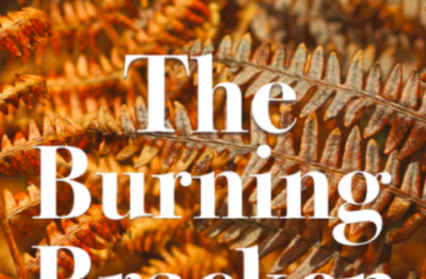Alexa Price reviews The Burning Bracken by Morgan Davies, a work of eco-fiction which looks at the dynamic relationship between humanity and an ever changing rural landscape.
Morgan Davies’ debut novel The Burning Bracken invites readers to experience the highs and lows of Welsh farming life, and how it affects the nature that surrounds us. Exploring the continuing collapse of the natural world and offering multiple takes and contrasting ideas on the issue, this novel asks its readers to think about how they approach the environmental worries that dominate society today. The story follows Sarah, who has recently left her partner and is looking for somewhere to begin again. Reflecting back fondly upon childhood memories of happy holidays with her grandparents, Sarah decides to travel from London to Wales. At Hafod Farm she finds refuge with a kind couple, Sioned and Evan, who offer her cheap rent in return for some help on the farm. Despite hoping to find peace in the countryside, the theme of destruction is extremely prevalent in the novel, Sarah’s vision of pastoral idyll quickly unravelling before her eyes.
Davies’ writing is unique and poignant, most notable are his descriptions of Wales and its farming industry, bringing an overlooked world to life. This writing has ideals, too — Davies’ message is a clear one, insisting that we should live with nature as equals rather than conquerors. His descriptions of man’s relationship with nature can often be sensually charged, in a way that is at once raw and unsettling: “The hills were awake with the movement of beasts as they pawed at the ground in their millions, their udders swollen with a liquid love, knowing the life inside them, ready to emerge.”
From the moment Sarah arrives it is extremely evident that Wales, not just the nature but the country itself, is its own presence. It can offer comfort and healing but can also be menacing, and – ironically – unnatural. In one heated talk between Evan and Rob (a conservationist who is also Sarah’s love interest), it is brought to light that sheep are not originally from Wales and were brought here from Iraq, even though ‘there’s nothing more Welsh than sheep’. In this way, nature becomes at once natural and unnatural – a product of an overstimulated, globalised world. It raises difficult questions about how we should think of the rural world, and whether – in a modern age – we can truly take for granted what is authentic, and what has a more clouded and complex history?
Davies’ deep respect for the Welsh language is also a prevalent theme throughout the novel (and rightfully so). As a Welsh speaker myself, these moments of dialogue raised no issues, but I do wonder what it might do to the flow of the novel for those unable to access these particular moments of speech. At one point, the character of Rhodri asks Rob, (who is English), if he is trying to speak the language of the heavens – “Iaith y Nefoedd, ti’n trio siarad?” – clearly implying, then, that Rob cannot speak a lot of Welsh. This is used in addition to Welsh expressions of surprise such as ‘Mawredd Mawr!’, and ‘Bobol bach!’ – phrases which will not return results via Google Translate. Arguably it offers immersion into the world of the novel, but it is approaches such as these which might also make the language feel less accessible to those outside of it.
At its close, The Burning Bracken ends exactly as it began: with Sarah running away. This cyclical element to the novel seems to show that man is always developing just as nature is, and that this restlessness can often be what disturbs peace in the first place. Despite her dreams of a peaceful life, Sarah’s experience of the reality is something much harsher altogether. When Evan and Sioned’s farm is struck by a deadly disease, they have to slaughter all their animals and subsequently cut off their source of income. By this point, any illusions of peaceful solace from the city have long been upturned; it is man who has been defeated by the tide and wrath of a landscape biting back. Beautiful as it may be, The Burning Bracken reminds us that nature ought to be respected as well as admired. As Davies summises in a beautiful passage: ‘You cannot defeat the land, nor can you really protect it. It cannot be owned, shared or reasoned with. It has neither head nor heart, no ears to hear, and when spoken to, cannot answer. It simply is: inhuman and unexplainable.’
The Burning Bracken by Morgan Davies is available via Victorina Press.











